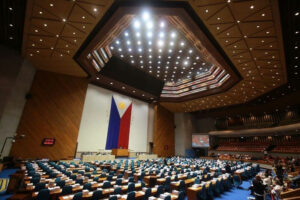
Congressman seeks probe of BI over Chinese influx
By Kenneth Christiane L. Basilio and Chloe Mari A. Hufana
A CONGRESSMAN has sought a probe of the Bureau of Immigration (BI) for allegedly allowing the entry of at least 1,500 Chinese nationals to study in Cagayan province in northern Philippines, citing potential bribery.
In a privilege speech on Tuesday night, Manila Rep. Bienvenido M. Abante, Jr. said the agency should how the students got their visas. He also filed a resolution calling for the investigation.
“The chief of the Immigration Regulation Division should be summoned and asked to explain how these Chinese nationals entered our country,” he told the plenary.
Immigration Commissioner Norman G. Tansingco has said 1,516 Chinese nationals in Cagayan had been given student visas. More than 400 Chinese nationals are physically attending schools in the province, while others are enrolled in distance learning.
Lawmakers from both Houses of Congress have sought an investigation of the influx of Chinese students in Cagayan as a matter of national security.
“The Bureau of Immigration will fully cooperate with the inquiry and agrees that the actions of foreign students in the country are worth looking into by government intelligence agencies as it is necessary for the preservation of national safety and security,” bureau spokesperson Dana Krizia M. Sandoval told BusinessWorld in a Viber Message.
Mr. Abante said the House of Representatives should look at the country’s visa system. “If initially they were allowed to enter on the strength of tourist visas, [the bureau] should explain how they were able to obtain student visas.”
“While these Chinese nationals are ‘students,’ their influx and their choice of school location should awaken and alarm us,” he added.
Meanwhile, a diplomacy expert said lawmakers might be justified in seeking to investigate the influx of Chinese students in Cagayan after recent cyber-attacks by Chinese hackers.
“Given the prevalence of modern tactics in warfare today including hacking and other cybersecurity attacks, it is not surprising anymore that the probe is being viewed from a national security point of view,” Josue Raphael J. Cortez, diplomacy and international affairs lecturer at the De La Salle-College of St. Benilde in Manila, said in a Facebook Messenger chat.
“In recent months, we have seen innumerable hacking on state websites, and given that China is among the primary countries utilizing cyber-warfare today, there is a possibility that some of these students are now being considered to be state intel,” he added.
Critics have slammed the anti-Chinese sentiment as Sinophobia amid growing tensions between the two nations in the South China Sea.
Tensions between the Philippines and China have worsened in the past year as Beijing continues to block resupply missions to Second Thomas Shoal, where Manila grounded a World War II-era ship in 1999 to assert its sovereignty.
On Tuesday, the Philippines accused China’s coast guard of harassment and damaging one of its boats near the Scarborough Shoal in the South China Sea.
The Philippine Coast Guard (PCG) said the two vessels stood their ground at the shoal, a key battleground in the South China Sea, but one sustained damage from the use of water cannons by two Chinese Coast Guard ships on April 29.
‘RIDICULOUS’
Last month, Surigao del Norte Rep. Robert Ace S. Barbers sought the investigation, saying some of the students might be spies.
The probe is not based on racism and Sinophobia, but a matter of national security, he said.
The Department of Information and Communications Technology in February linked the hacking of several state websites to internet protocol (IP) addresses from China.
Teresita Ang-See, founding president of Filipino-Chinese organization Kaisa Para Sa Kaunlaran, called the probe “ridiculous.”
“It is ridiculous,” she said in an e-mailed reply to questions. “What spies and what will they be spying on? In a country where nothing is secret, you don’t need students to spy on you.”
Most of the foreign students enrolled in Cagayan schools are masteral and PhD students, she pointed out.
“Now, they felt devastated because their hard work went down the drain when do-gooders destroyed the repute of their school and denigrated the degrees they will obtain,” she added.
Mr. Cortez said the students might just have been attracted to low-cost schools in the Philippines.
Ms. Ang-See said the Philippines “renounces war as an instrument of national policy.” She urged lawmakers to keep that in mind for diplomacy to work.
“Although diplomatic avenues have been criticized for taking a long time to [bring about] a peaceful resolution to the conflict… it is still the most viable [way],” Mr. Cortez said.
A United Nations-backed tribunal in the Hague ruled in 2016 that China’s expansive claim had no legal basis, a decision Beijing has rejected.



